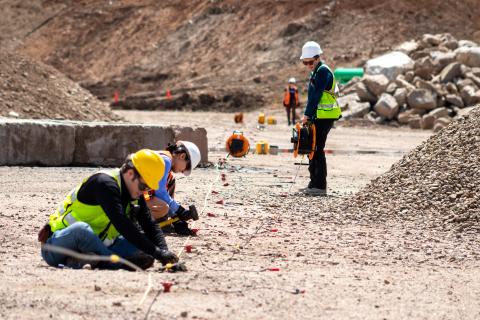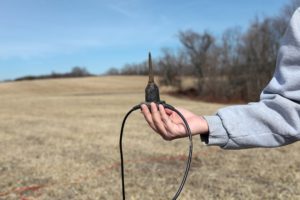All Categories
Featured
Table of Contents
Geophysical Survey - Explore The Seafloor in Clarkson WA 2022

Other possible geophysicist majors that aren't geophysics or geoscience include: Atmospheric sciences and meteorology Chemical and physical oceanography Earth science Environmental science Hydrology and water resources science Materials science By earning any geophysicist degree, and by taking the required geology courses, you ought to get approved for an entry-level position as a geoscientist or geophysicist.
Eventually, trainees must find out: a branch of geology that looks at the different elements of minerals, consisting of chemical composition, internal crystal structure, and physical properties. the research study of rocks and the procedures and conditions that form and change them in time. There are a couple of neighborhoods in this branch of geology, consisting of igneous, metamorphic, and sedimentary rocks.

This field analyzes structural rock features such as cleavage, faults, joints, and little folds. They must likewise find out the computer system skills necessary to: examine information develop digital models and maps operate geoscientists' software application Trainees should likewise take advantage of all opportunities to gain real-world experience. Aspiring geophysicists need to anticipate to hang out learning: in the class in the field in laboratories Clearly, skills taught in the classroom are really important for aiming geophysicists.
Course: Basics In Geophysical Surveying in Neerabup Western Australia 2021
For instance, geoscientists spend a great deal of their time outside when operating in the field, so they should have "outdoor skills" like camping and operating boats, aircraft, and other vehicles. Due to the fact that they invest a lot time in remote areas, it's essential that geophysicists also have the physical stamina to carry essential devices on their walkings to places of research study.
The task provides: a high mean and top incomes a high rate of individual fulfillment amongst geophysicists low work stress positive job outlook Further details on profits capacity and job outlook is detailed below. For trainees wanting to land an entry-level function as a geoscientist or geophysicist, it takes 4 years, or the time required to finish a bachelor's degree in geophysics or an associated discipline.
Some research study positions in geophysics need doctoral degrees. Also, if you plan to teach at a college or university, you should earn a Ph - Airborne Geophysical Measurements in Floreat Aus 2023. D. in geophysics or an associated field. The time it requires to earn a Ph. D. varies by organization and program, however it generally takes four to 6 years beyond the bachelor's degree.
Geophysicist - Job Role - Job Information in Connolly Aus 2023
A lot of employers need prospects to have a bachelor's degree in geophysics or a closely associated discipline for all entry-level positions. And, in some cases, companies require a master's degree. As an outcome, there's no chance around the degree requirements for ending up being a geophysicist. The majority of companies will anticipate or need a practicing geologist to be licensed for positions beyond those at the entry level.
Presently, 31 states require licensing for geologists, although licensing is not always required, especially for entry-level work. The states that do issue licenses use the Basics of Geology Exam (FGE), which is administered through the National Association of State Boards of Geology (ASBOG). Now that you know which degree for geophysicist tasks you require, you'll require to land a job, and it's essential to discover just how much cash you can make in this profession.
According to BLS, the typical yearly wage for geoscientists is $93,580. According to BLS, specific industries use higher wages for geoscientists, and in some cases, they offer higher-than-average earnings.
Geophysical Survey in Mt Richon WA 2020
Mining, quarrying, and oil and gas extraction offers over $32,000 more annually than the typical yearly wage for this occupation. The federal government, too, offers over $10,000 more in profits than the national average for geoscientists. In addition to market type, geographic place can considerably impact profits for this profession.

The top-paying states and their yearly mean wages, according to the BLS, consist of: Texas $166,720 Oklahoma $149,630 Pennsylvania $120,590 Hawaii $120,130 Colorado $107,260 These five top-paying states provide much higher salaries than the average for this profession. In fact, wages for geoscientists in Texas are over $73,000 higher than the national average.
It must come as not a surprise that the majority of these high-paying locations are in Texas and Oklahoma, but some are found in California, Louisiana, and Colorado. The leading 10 highest-paying city locations for geoscientists are: Houston-The Woodlands-Sugar Land, Texas: $188,400 Tulsa, Oklahoma: $186,490 Midland, Texas: $167,040 Odessa, Texas: $147,080 Oklahoma City, Oklahoma: $145,350 Bakersfield, California: $130,080 Urban Honolulu, Hawaii: $124,470 New Orleans-Metairie, Louisiana: $121,030 Washington-Arlington-Alexandria, DC, VA, MD, WV: $120,180 Denver-Aurora-Lakewood, Colorado: $116,910 For some geoscientists and geophysicists, residing in a metro city is not as appealing as residing in a smaller neighborhood.
Table of Contents
Latest Posts
Airborne Geophysical Survey in Hocking Aus 2023
Geophysical Survey Services - Geophysical Test Methods in Karrinyup Australia 2020
Geophysicist: Job Description, Duties And Requirements in The Vines Aus 2020
More
Latest Posts
Airborne Geophysical Survey in Hocking Aus 2023
Geophysical Survey Services - Geophysical Test Methods in Karrinyup Australia 2020
Geophysicist: Job Description, Duties And Requirements in The Vines Aus 2020